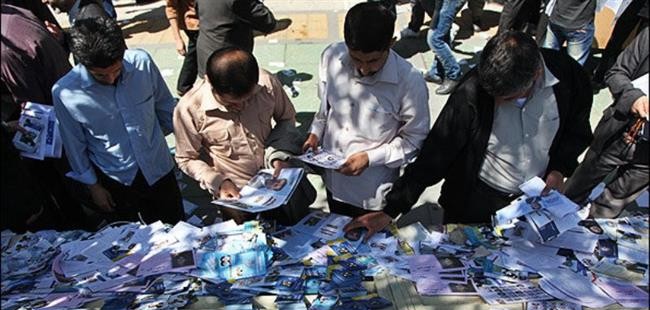PHOTO: Men look at candidates’ leaflets in Tehran on Thursday
LATEST
Candidates have officially begun campaigning for the February 26 elections for Iran’s Parliament, amid hints of the extent of the manipulation to ensure a centrist-reformist bloc does not gain influence.
The Guardian Council — the 12-member body appointed by the Supreme Leader and the judiciary — has disqualified 97% of the reformist candidates. The purges ensure that the faction, suppressed in Iranian politics for more than a decade, can have no more than a limited minority in the next Majlis.
The Council initially disqualified 60% of the 12,000 applicants for the 290-seat Majlis, including 99% of the 3,000 reformist hopefuls. After discussions with the Rouhani Government, some candidates were reinstated, but the crackdown on the reformists was largely maintained, with only 90 approved.
Paradoxically, however, the purge may strengthen the prospect of a reformist alliance with centrists — linked to President Rouhani and former President Rafsanjani — succeeding in some areas of Iran, including the capital Tehran.
Earlier this week, leading reformist Mohammad Reza Aref announced a full 30-candidate list for Tehran under the title “Coalition of Reformists and Government Supporters”. The group also includes the “maverick” Conservative MP Ali Motahari, a prominent critic of regime tactics such as the five-year house arrests of opposition leaders.
The Guardian Council has also clamped down on elections for the Assembly of Experts, the 88-member body which chooses the Supreme Leader. Only 166 of 801 applicants were approved. Among those disqualified was Hassan Khomeini, the grandson of the founder of the Islamic Republic.
Both the Supreme Leader and Revolutionary Guards have applied further pressure, with warnings to voters of “enemy plots” to undermine the elections.
Ayatollah Khamenei claimed the “sedition” was being pursued by the US through criticism of the Guardian Council, while Guards commander Mohammad Ali Jafari declared vigilance against any attempt to repeat the mass protests after the disputed 2009 Presidential election.
European Court Says Bank Sanctions Were “Error of Law”
The European Union’s top court ruled on Thursday that the assets of Iran’s Bank Mellat were unfairly frozen from 2010.
The European Court of Justice dismissed an appeal brought by the European Council, ruling that Bank Mellat’s funds should not have been restricted between July 2010 and January 2016.
The Council imposed the sanctions with the claim that the funds supported Iranian nuclear and missile programs. The money was unfrozen in January as part of the implementation of the July 2015 nuclear deal between Iran and the 5+1 Powers (US, Britain, France, Germany, China, and Russia).
The Court of Justice cited “an error of law” in the imposition of the freeze.
Bank Mellat said on Thursday that it may pursue a court case against Britain for damages.

